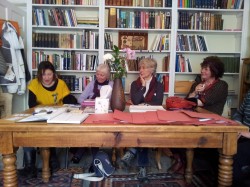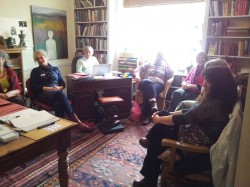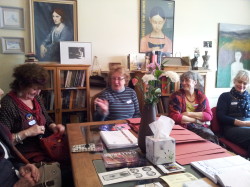The History 51 Battalion meets up
/ On 9 February we invited all those who had expressed an interest in History 51 to attend an open afternoon at the Hypatia Trust in Penzance. Several were not able to make it but we still had a room of 18 people (all women) eager to share their passion, thoughts and ideas about how their own experiences could be brought to bear on this seminal project.
On 9 February we invited all those who had expressed an interest in History 51 to attend an open afternoon at the Hypatia Trust in Penzance. Several were not able to make it but we still had a room of 18 people (all women) eager to share their passion, thoughts and ideas about how their own experiences could be brought to bear on this seminal project.
I think everyone would agree that the local rug hookers really made our meeting, they turned up in force!
We enjoyed all sorts of conversation, from setting up our own tour businesses, ornamental pets, herbal medical knowledge, women war artists to keeping hens, rug hooking, fishing ancestors, women in sport, Cornish migration, slavery and anti-slavery, medieval business women, husbands, teenage parents and weaving.
I don’t think I have been in a room full of more articulate people in my life!
What did we talk about?
The promise of tea and cake on the horizon got our humors working and any residual nerves at the thought of that classic ice-breaker, 'going around the room and telling each other a bit about ourselves', were soon forgotten. We enjoyed all sorts of conversation, from setting up our own tour businesses, ornamental pets, herbal medical knowledge, women war artists to keeping hens, rug hooking, fishing ancestors, women in sport, Cornish migration, slavery and anti-slavery, medieval business women, husbands, teenage parents and weaving.
History 51 is not a project just for women. It is about women
While I was listening my most immediate thought was how differently a room full of men or a mixture of men and women might have discussed their heritage. Here, it was personal experience and observation that informed the opinions of those present. History 51 is not a project just for women. It is about women and as such it is of importance to all of us, boys and girls, men and women.
It struck me that the study of history and the practices of heritage are inescapably 'male structures'. The development of social history, of which women's history is traditionally considered a part, was formatively a movement led by men.
In the effort to equalise the treatment of men and women in history, I believe it is essential we recognise this because otherwise women's history, as a fundamental field of study in its own right, will never be more than a niche subject destined to be a minority topic.
This is why we are called History 51. Women make up more than half the world's population but women themselves don't see themselves as worthy a topic of study as do men (cue: generalisation).
...we will be documenting and sharing information about the ordinary, as well as the extraordinary; and about bad women as well as the good women who never seem to make history.
So the project's aim to provide current and future generations of people growing up and living in Cornwall and Scilly positive female role models was considered possibly its most important. This means we will be documenting and sharing information about the ordinary, as well as the extraordinary; and about bad women as well as the good women who never seem to make history.
Why a battalion?
... an organised group of people pursuing a common aim or sharing a major undertaking.
There was a strong sense of purpose about our first meeting. There was also a strong sense of the need for an organised approach and so, inevitably, I could only think of military metaphors. Women do need to fight to get their stories and opinions heard and so I thought it was appropriate that we behave like a battalion, an organised group of people pursuing a common aim or sharing a major undertaking.
What next?
Each person was given a folder with an information pack aimed at familiarising contributors and correspondents with History 51 and answering questions I predicted they may have. This pack will be emailed to all those who were not able to attend and is available via the link below.
Download History 51 Contributor Pack (PDF, 611 KB)
Next steps are to start recording who is interested in what and sharing this information amongst the group. The great thing about History 51 is that even those running the project are getting stuck into some new research and exploration. I am dusting off my old medievalist's gloves. Polly Attwood, Hypatia Trust Director, is thinking about looking at the Cornish connections to Transatlantic Slavery and Jo Schofield, Hypatia Trust Events Co-ordinator, is looking at the women of the Godolphin family.
The online database for the Cornish Women’s Index is being developed and will be due for testing early next month and then it will be time to organise some training. I am also contemplating using screencasts and Google Hangouts for live online training.
Our events co-ordinator, Jo Schofield, is currently scouting venues for our workshops. We already have one in Liskeard Museum confirmed and another almost confirmed in Fowey. Firm dates will follow some time in March.
Next we will be buying the equipment needed, making sure that History 51 is regularly promoted online and in the press, and commissioning some quirky bookmarks or postcards to be widely distributed across Cornwall and Scilly, and beyond.




